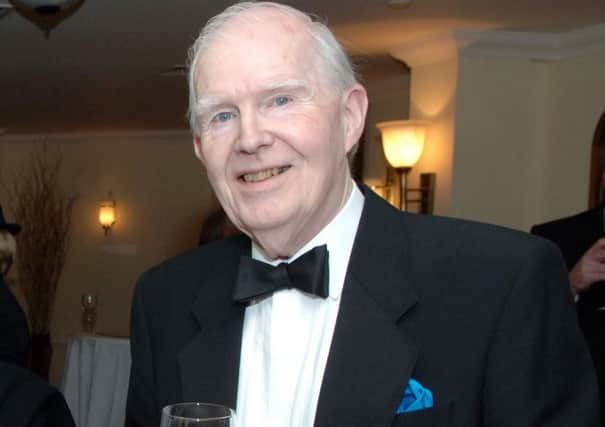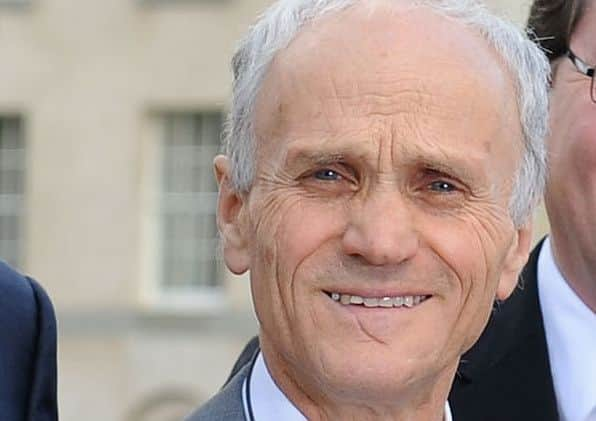George Quigley was a great man who devoted his life to a small place, Northern Ireland


Last month marked the third anniversary of the death of Sir George Quigley: outstanding civil servant, top business leader, innovative cross-border co-operator and peacebuilder.
In more than 20 years working and living in Northern Ireland, Sir George was quite simply the most impressive human being I had the privilege of meeting: a brilliant visionary who was also a model of kindness, courtesy and respect for others.
Advertisement
Hide AdAdvertisement
Hide AdVery occasionally a small place throws up a great man, and that great man decides to devote his life to that small place. George Quigley, born in rural county Londonderry and respected throughout Ireland, Britain and Europe at his death, was one of those men.


Three months ago the Ulster Bank (of which he was a former chairman) and Appletree Press published A Time to Speak, a book of his collected speeches.
This showed the extraordinary range, depth and wisdom of his mind. Here are reflective and provocative essays on the nature of leadership; the economies of Northern Ireland and the Republic; the cross-border ‘island economy’ (of which he was the original proponent); the economic dividend of peace in Northern Ireland; the need for a lower corporation tax rate (of which he was the principal champion); the post-2008 international economic crisis; North/South relations; the health service; higher education; working with ex-prisoners; loyalism; Christian Unity; relations between Northern Ireland and India and the Czech Republic – one could go on and on.
George Quigley was a sage and humane realist. Noting that Ireland contained “too many dealers in ultimates, most of them so far spectacularly unsuccessful”, he urged his fellow Ulstermen and women “not to insist on agreeing on ultimate objectives. People with different ideas of what makes the world tick can work together on specific problems.”
Advertisement
Hide AdAdvertisement
Hide AdHe spent his life both in the public and private sectors thinking up imaginative yet practical ways of dealing with the many problems facing the province of Northern Ireland and the island of Ireland.


In 1992 he produced a proposal for a ‘Belfast-Dublin economic corridor’ which, by following the example of other successful cross-border ‘corridors’ in North America and Asia – based on factors like good transport infrastructure, intense interaction between dynamic companies and strong university-industry linkages - would contribute greatly to Northern Ireland’s competitiveness and prosperity. At the time, with Ulster still in the grip of the IRA’s campaign of violence, it was a courageous suggestion.
Much of what he proposed then has since come to pass, through collaboration between the two business confederations, North and South, the Belfast Agreement and the work of InterTradeIreland. He did not deny politics its place but strongly emphasised “the force of enterprise to make things happen.”
Sir George was passionately optimistic about Northern Ireland. He was determined that it should learn to stand on its own feet and not have to be propped up by massive Treasury subventions. The way to do this, he said again and again, was for “a huge step change in our economic performance”.
Advertisement
Hide AdAdvertisement
Hide AdHe saw the real prize for getting this “growth engine” up and running, “a far more open, self-confident, cosmopolitan, vibrant North, with different perspectives and different goals, able to offer new opportunities and new horizons to a new generation”. That was, for example, why in his mid-seventies, when other men with his huge record of achievement would be beginning to put their feet up, he tirelessly spearheaded the campaign for a lower corporation tax rate.
He was critical of the government in London for its “extremely disappointing” financial support to the Executive during the difficult transitional years immediately after the Belfast Agreement. He quoted a report on the aftermath of the war in Bosnia which emphasised that “a political settlement must be structured in a way that encourages the economic development of a vibrant private sector capable of sustaining high levels of employment and growth.” Clearly this has not happened in Northern Ireland.
He was also passionate about the need to find a place for what he called “unarmed loyalism” in the body politic. He felt that one of the great mistakes of the peace process was “to leave loyalism largely on the sidelines” by not supporting those former paramilitary leaders who were seeking to manage a process of transition to democratic politics. His detailed ideas for bringing the loyalists in from the cold – including a special development corporation for Belfast’s deprived areas and imaginative proposals to oversee parades through invoking the European Convention on Human Rights – fell on deaf ears.
Sir George’s wise words ring as true today as at any time over the past century: “No community can expect to reach its full potential as an economic player - or even be taken seriously - unless it exhibits political and community stability. The world does not expect us to solve all the problems before it takes us seriously. It just expects us to show sure-footedness in negotiating the slippery terrain and to demonstrate that, as a community, we have reasonable problem-solving skills and competence.”
Andy Pollak was founding director of the Centre for Cross Border Studies in Armagh and is a former journalist with the Irish Times in Belfast